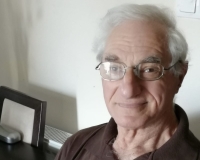Israel was not my Promised Land
Ervín Schönhauser was born as a twin on May 24, 1940, in Topoľčany into an orthodox Jewish family of a bank clerk. Prior to the deportations in 1942, their family was protected by their father‘s exception as an „economically important Jew.“ After 1945, the whole family was at the beginning of September transported to a concentration camp in Sered and subsequently into Terezin. All of them survived and they returned to Topolcany, where Ervin was a direct witness of a pogrom on Jews on September 24, 1945. Despite several requests, the Topoľčany authorities did not return anything from their Aryanized property. The family then moved to Bratislava. During 1948/49, the majority of the family emigrated to Israel. After the communist „revolution“ the family maintained „kosher“ rules in their household. Ervin completed studies at industrial high school, but his studies did not interest him. In 1959, his father was fired on charges of sympathizing with Zionism from his work, and Ervín‘s younger brother emigrated to Israel in 1966. In the same year, the witness married and his son was born a year later. Despite that, he decided to emigrate to Israel alone, determined to stay living there. After three months of suffering, he however decided to return. After the invasion of the Warsaw Pact troops on August 21, 1968, his twin Robert emigrated to Switzerland. The witness was often summoned for interrogation by the State Security Service, and until 1989 the regime allowed him only two visits to his brother. In 1990, his younger son died tragically in a car accident. Since the age of 56, he has been professionally singing solo songs, mainly Jewish songs, and represents Slovakia at various events abroad. He is an active member of the Jewish community in Bratislava and The Hidden Child organisation.
